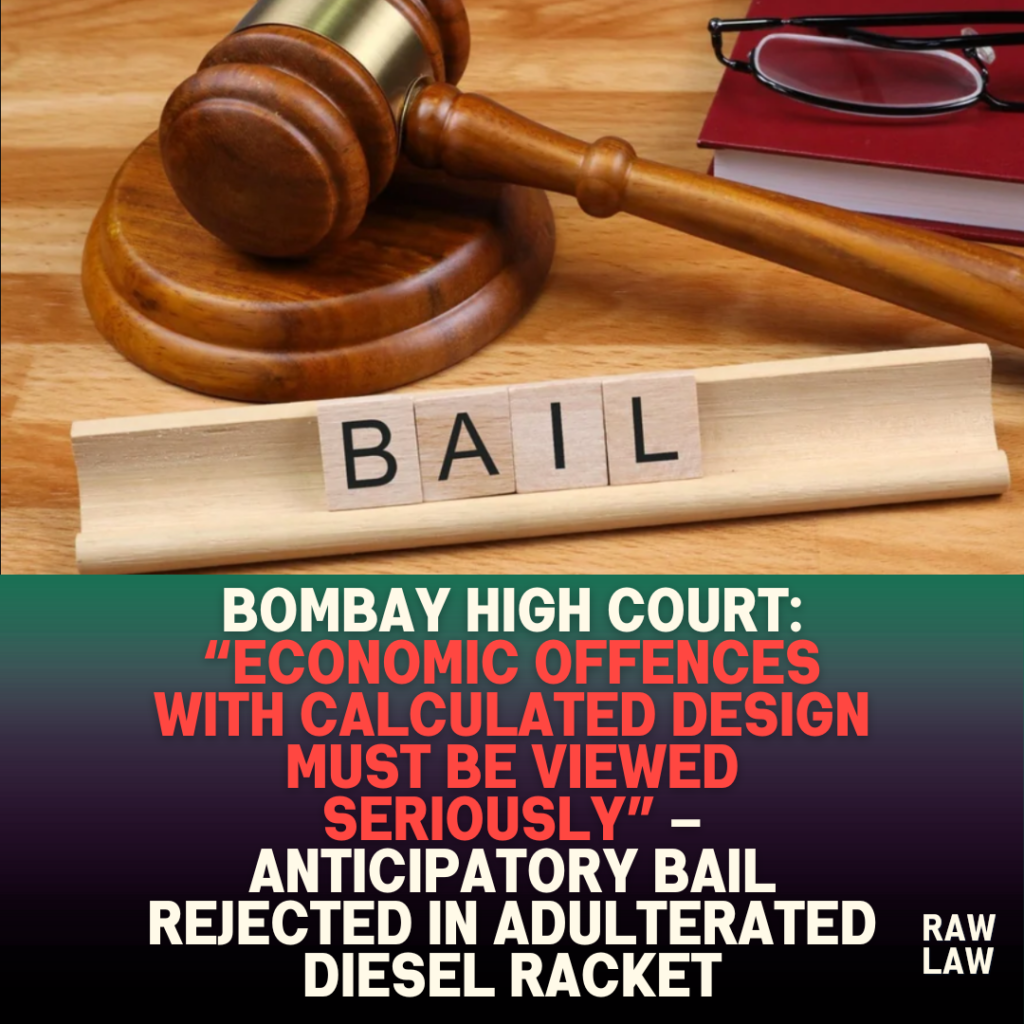Court’s Decision
The Bombay High Court (Justice Amit Borkar) rejected the anticipatory bail application of two businessmen accused of orchestrating a racket involving adulterated diesel. The Court held that the applicants used layered paper transactions through multiple companies under their control to camouflage illegal diversion of petroleum products. Observing that “economic offences committed with calculated design stand on a distinct footing and must be viewed seriously,” the Court ruled that custodial interrogation was necessary to unearth the larger conspiracy.
Facts of the Case
- Crime No. 346 of 2024 was registered with Uran Police Station, Raigad, under Sections 287, 125, 3(5) of the Bharatiya Nyaya Sanhita, 2023; Sections 3 & 7 of the Essential Commodities Act; Sections 3, 4, 6, 23(a) of the Petroleum Act; and Section 4 of the Inflammable Substances Act.
- On 12 July 2024, police inspected a customs bonded warehouse and found eight tankers—two containing hydrocarbon oil and six containing Process Oil-40. Testing revealed adulterated diesel in two tankers, leading to seizure.
- Documents showed the consignment was imported by Sole Bloom Pvt. Ltd., sold via high-seas sale to Siddhidhata Trading Company, and then to Naksh Trading Company.
- Investigation revealed all three companies were controlled by applicants (two brothers) using a common email ID linked to their bank accounts, indicating that the transactions were a camouflage.
- Applicants approached the High Court under Section 482 BNSS seeking anticipatory bail.
Issues
- Whether the FIR and seizure were invalid due to lack of authorization of police officers under petroleum and essential commodities laws.
- Whether the laboratory report could be relied on at the bail stage despite alleged procedural irregularities.
- Whether custodial interrogation was necessary given the allegations of layered transactions and adulterated diesel trade.
Petitioners’ Arguments (Applicants)
- The FIR was illegal as the Assistant Police Inspector (API) lacked authority under Petroleum Orders and the Essential Commodities Act.
- Seizure was not validly made under Section 3(j) of the Essential Commodities Act.
- Customs test report was inadmissible, not NABL-accredited, and did not meet IS 1460:2017 diesel fuel standards.
- Hydrocarbon/Process Oil is not a notified commodity, and no evidence showed it was meant for sale as automobile fuel.
- Relied on Abhay Anup Rathi v. State of Maharashtra (2023), Avtar Singh v. State of Punjab (2023), and Bombay HC Criminal Writ Petition No. 1839/2013.
Respondent’s Arguments (State)
- Banking trail showed all three companies (Sole Bloom, Siddhidhata, Naksh Trading) were linked by a single email ID belonging to accused No.2, proving control by applicants.
- Layered transactions were only a façade; Naksh Trading was a front entity.
- Laboratory report confirmed adulterated diesel in two tankers; six tankers were released as they contained process oil.
- FIR was valid as API acted under instructions of Senior Inspector, and investigation was conducted by an Inspector.
- Custodial interrogation was essential to probe the conspiracy, money trail, and other beneficiaries.
Analysis of the Law
- On FIR validity: The Court held that whether the API had legal authority and whether seizure was proper are issues of trial, not to be decided at anticipatory bail stage.
- On laboratory report: Even if not NABL-accredited or incomplete, it constituted prima facie material indicating adulteration. Defects can be tested during trial.
- On layered transactions: The Court noted that the same email ID linked to all three companies’ bank accounts proved control rested with applicants, and transactions were only a camouflage.
- On public interest: Circulation of adulterated fuel poses risk to safety, economy, vehicles, and revenue, affecting society at large.
Precedent Analysis
- Abhay Anup Rathi v. State of Maharashtra (2023) – Considered on authority under petroleum orders.
- Avtar Singh v. State of Punjab (2023) SCC OnLine 319 – On FIR and seizure validity.
- Principles on anticipatory bail in economic offences – SC rulings emphasising seriousness of such crimes.
Court’s Reasoning
- The applicants layered transactions across multiple companies but controlled them through a single email ID—prima facie showing deliberate design to conceal adulterated fuel trade.
- The claim that Chartered Accountant handled accounts was rejected as implausible.
- Custodial interrogation was necessary to unearth conspiracy, trace supply chain, and identify beneficiaries.
- At bail stage, Court cannot conduct a mini-trial on FIR validity or lab procedures.
- Anticipatory bail is extraordinary relief, not meant to shield accused in serious economic offences.
Conclusion
The High Court rejected the anticipatory bail application, holding:
“Economic offences touching public interest and involving adulterated petroleum products cannot be taken lightly. The applicants, having orchestrated layered transactions through controlled entities, are not entitled to anticipatory bail.”
Implications
- Reinforces strict judicial stance against economic offences involving essential commodities and petroleum products.
- Clarifies that procedural objections (authority of API, lab accreditation) are matters for trial, not anticipatory bail stage.
- Demonstrates readiness to apply “lifting of corporate veil” in bail jurisprudence where companies are used as fronts for fraud.
